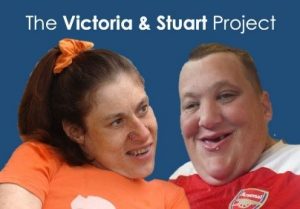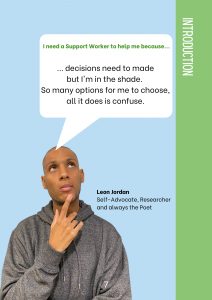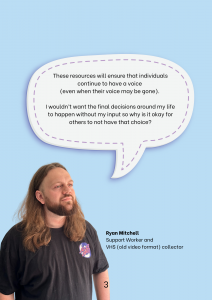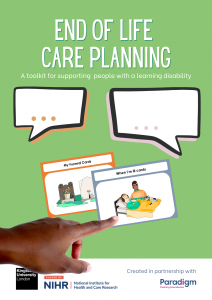

![]()
Preparing well for death is one of the most important things we can get right for the people we support and care for. As one of our advisors pointed out it is only irrelevant for people who are immortal!
Helping people who are facing serious illness to talk about and think through plans for what we want whilst we’re still alive is also vital.
We know it’s not easy for any of us to think & talk about being very ill, death and dying.
But that is what the Victoria and Stuart Project www.victoriaandstuart.com led by Professor Irene Tuffrey-Wijne at Kingston University has been doing for the last couple of years.
Firstly, our researchers (with and without learning disabilities) listened to:
- people with learning disabilities,
- friends and family members,
- support workers,
- learning disability service managers,
- health and social care professionals and
- people who work in palliative care
to find out what was needed.
Then, we all worked together to design & create resources (pictures, cards and guidance) to help people with a learning disability make choices around end-of-life care (including for when they are very ill) and funeral planning.
Our new resources are:
- Let’s talk about funerals pictures
- My funeral cards
- Am I Going To Die? Books Beyond Words Book
- When I’m ill cards
Now, we are testing our four sets of resources & guidance on how to use them to make sure these are the best they can be. And you can help us!
In early Summer 2024, we will put the finished cards, pictures and guidance online so anyone download and use them to support talking, thinking and planning together.
I’ve asked some of my colleagues with & without learning disabilities to tell you why these resources are important, how they might be used.
Leon Jordan, Researcher with a Learning Disability, tells us poetically why these resources are needed
‘Decisions need to be made
But I’m in the shade
So many options for me to choose
All it does is confuse’
Richard Keagan-Bull, Research Assistant with a Learning Disability, tells us
“I think it’s important to use the cards cos pictures can also tell a story (they can) and people who can’t choose words can make a story from the pictures (they can) that’s a good way of explaining what’s going to be happening and all that. These cards are good to use because they are an easy way of explaining to people what’s going to be happening”
“It’s a really good idea not just for People with Learning Disabilities but (for) People who don’t use English as their first language & People who find it very complicated to use lots of different words. They might find it very good to try and use the cards cos it will make it easier for them” Amanda Cresswell, Researcher with a learning disability told us.
Prof Irene Tuffrey-Wijne asked Amanda what is so good about the cards and pictures. Amanda tells us “The cards are really good and the pictures because if people can’t communicate with language then they can point to the pictures and say ‘This is how I feel inside’ , ‘This is how I want my funeral to be’. And that’s why it’s so important – why we’ve done them for ANYONE to use”
Ryan Mitchell, Support worker told us how supporting these conversations is vital to make sure People with learning disabilities’ voices are heard and taken account of in a ongoing way:
“These resources will ensure that individuals continue to have a voice (even when their voice may be gone). I wouldn’t want the final decisions around my life to happen without my input so why is it OK for others not to have that choice” – Ryan Mitchell, Support worker


Are you able to help us try out our new resources for end-of-life care planning with people with learning disabilities?

Can you (or someone you know) help us to test out our Toolkit:
- try out the resources during December 2023 or January 2024
- give us feedback on what you did and how it went (by end of Jan)
If so, please sign up as Toolkit Testers in our Research Study
- Read our Participant Information sheet here
- Sign up as a Victoria and Stuart Project Toolkit Tester here
- Contact Sarah Gibson l.gibson@kingston.ac.uk with any questions
Email me Sarah Gibson, to become part of our research by using the resources and telling us how it goes.
And, once you have signed up,
Sarah will send you the Toolkit to download and for you to use to start conversations and support choices with & for:
- People with learning disabilities
- People’s friends and families
You will then give us feedback on the resources and how you used them using our How did it go? Tester Feedback Form.
We will use Testers’ feedback to finalise the Resources & Guidance in Spring 2024 and to tell people about what and whom they were useful and then launch the trialled Toolkit for all to use June 2024.
You can also visit our website www.victoriaandstuart.com listen to us talk more about our work & resources in recent www.pcpld.org webinars.
We look forward to hearing from you.
Sarah Gibson, Research Associate, Victoria and Stuart Project, Kingston University for the Victoria and Stuart Project Research Team
